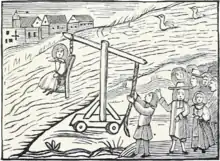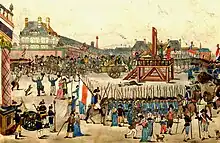tumbril
English

A tumbril (sense 1) or cucking stool.

A tumbril (sense 3), carrying prisoners to a guillotine.
Etymology
From Old French tumberel (modern French tombereau, in Anglo-Latin tumberellus), from tomber, tumber (“to fall”).
Pronunciation
- IPA(key): /ˈtʌmbɹɪl/
Noun
tumbril (plural tumbrils)
- (historical) A kind of medieval torture device, later associated with a cucking stool.
- A cart well suited to dumping its load easily, being single-axled and also often having a hinged tailboard; a dumpcart.
- 1800, The Times, 17 Mar 1800, p.3 col. B:
- They then confined the Dean, while they rifled the house of every valuable article, as well as plate and money; all that was portable they loaded on Mr. Carleton’s own tumbril, to which they harnessed his horse […]
- 1994, Cormac McCarthy, The Crossing:
- They’d rigged a makeshift tent of sheeting over the little tumbril of a cart and they’d put up a sign at the front that gave her history and the number of people she was known to have eaten.
- 1997, Don DeLillo, Underworld:
- This is a sixteenth-century work done by a Flemish master, Pieter Bruegel, and it is called The Triumph of Death […] He studies the tumbrel filled with skulls.
- 1800, The Times, 17 Mar 1800, p.3 col. B:
- (historical) A cart used to carry condemned prisoners to their death, especially to the guillotine during the French Revolution.
- 1848, The Times, 26 Jun 1848, p.4 col. B:
- It is now ascertained that the tumbrel and the torches which figured in the massacre-scene of the 23d of February were prepared beforehand […]
- 2002, Colin Jones, The Great Nation, Penguin, published 2003, page 370:
- If there would be former freemasons on the Committee of Public Safety during the Terror, they would be numbered too in the ranks of the émigré armies and counter-revolutionary Chouan rebels, and in tumbrils bound for the guillotine.
- 1848, The Times, 26 Jun 1848, p.4 col. B:
- (UK, obsolete) A basket or cage of osiers, willows, or the like, to hold hay and other food for sheep.
Translations
cart used to carry prisoners to death
|
Further reading
 tumbrel on Wikipedia.Wikipedia
tumbrel on Wikipedia.Wikipedia  cucking stool on Wikipedia.Wikipedia
cucking stool on Wikipedia.Wikipedia
This article is issued from Wiktionary. The text is licensed under Creative Commons - Attribution - Sharealike. Additional terms may apply for the media files.